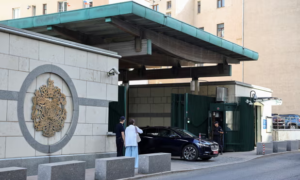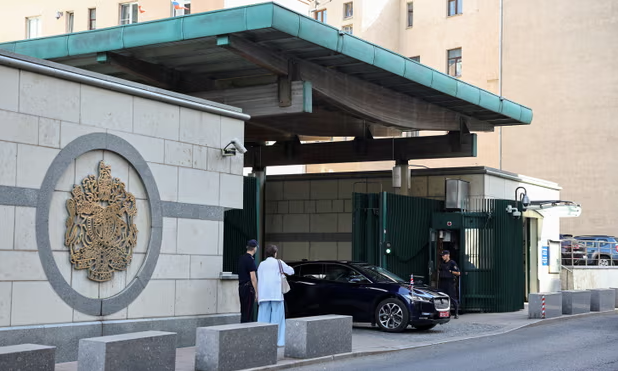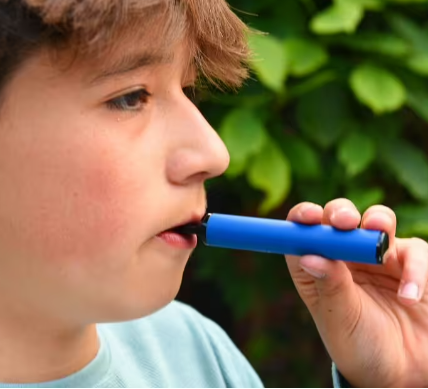FSB says documents show diplomats in Moscow were helping to coordinate ‘escalation of military situation’ in Ukraine

An official car leaving the British embassy in Moscow. Photograph: Evgenia Novozhenina/Reuters
Russia announced it had revoked the accreditation of six British diplomats in Moscow on accusations of espionage as Keir Starmer prepared to meet Joe Biden in Washington to discuss how Ukraine could use long-range missiles deep inside Russian territory.
Moscow’s FSB domestic spy agency said on Friday that it had acted on documents showing that part of the Foreign Office was helping coordinate what it called “the escalation of the political and military situation” in Ukraine.
The Foreign Office, however, said the move had been made last month as part of a continuing diplomatic tit-for-tat. Sources indicated the British diplomats had left Russia weeks ago and were now being replaced.
A Foreign Office spokesperson said: “The accusations made today by the FSB against our staff are completely baseless … We are unapologetic about protecting our national interests.”
The British government expelled the Russian defence attache in May, accusing him of being an undeclared intelligence officer, and removed diplomatic status from several Russian-owned buildings in the UK.
Moscow’s statement came as the British prime minister was preparing for talks with the US president over allowing Ukraine to use Storm Shadow missiles inside Russia at a foreign policy summit at the White House.
The two leaders met to discuss what Starmer described on Thursday as “the strategic context” in Ukraine, the Middle East and the Indo-Pacific.
At the beginning of the meeting Joe Biden, the US president, said he did not take Russian threats seriously: “I do not think much about Vladimir Putin”.
The meeting was called at the request of the UK, the White House said. After a short one-to-one between the leaders, the British foreign secretary, David Lammy, and the US secretary of state, Antony Blinken, joined the prime minister in a wider group discussion.
No press conference is scheduled and the UK side has been dampening down expectations of a public announcement about Storm Shadow, a missile with a range of at least 190 miles, that could be used to strike airbases, missile launch sites and other military targets deep inside Russia.
The discussions about its potential use have triggered political conflict between London and Moscow. Putin warned on Thursday that allowing Ukraine to use western-made long-range missiles would amount to Nato being at war with Russia.
Starmer, however, told reporters as he flew into Washington: “Russia started this conflict. Russia illegally invaded Ukraine. Russia can end this conflict straight away. Ukraine has the right to self-defence.” Putin had been expected to counter talk of fresh help for Kyiv with threats.
Ukraine’s president, Volodymyr Zelenskiy, has been pushing for months for permission to use the missiles, including during talks this week with Lammy and Blinken.
British sources say London and Washington have decided to allow Ukraine to use long-range missiles, but are not yet willing to announce it. Deploying the missiles, western officials add, should be part of a wider plan designed to try to bring about an end to the full-scale war.
Zelenskiy pleaded on Friday for the US and UK to speed up the process and allow Kyiv to make the war “become more difficult for Russia”.
“Anyone who sees at a map where Russia launches its strikes from, trains its forces, keeps its reserves, locates its military facilities, and what logistics uses clearly understands why Ukraine needs long-range capabilities,” he said in a lengthy statement on social media.
Ukrainian leaders are intensely frustrated that the Kremlin is able to launch deadly missile strikes across Ukraine, while they are unable to target sites in Russia because the weapons available are manufactured in the west and until now western governments have not approved their use.
Storm Shadow is made by a company controlled by British, French and Italian interests, and some of its components are made in the US, giving all four countries a veto on its use. Ukraine only has a very limited long-range missile capability of its own.
The Russian embassy in London said Britain was wasting money in supporting Ukraine, that any arms donated would “likely go up in smoke” and that the policy of helping Kyiv would “provide no relief to ordinary Brits, who are preparing to tighten their belts as winter approaches”.
The six expelled British diplomats were named on Russian state TV, which also showed photographs of them.
An FSB employee told Rossiya-24: “The English did not take our hints about the need to stop this practice [of carrying out intelligence activities inside Russia], so we decided to expel these six to begin with.”
The FSB said in its statement: “The facts revealed give grounds to consider the activities of British diplomats sent to Moscow by the directorate as threatening the security of the Russian Federation.
“In this connection, on the basis of documents provided by the Federal Security Service of Russia and as a response to the numerous unfriendly steps taken by London, the ministry of foreign affairs of Russia, in cooperation with the agencies concerned, has terminated the accreditation of six members of the political department of the British embassy in Moscow in whose actions signs of spying and sabotage were found.”
The FSB also said Russia would ask other British diplomats to return home if they were found to be engaged in similar activity.
The Russian foreign ministry spokesperson, Maria Zakharova, was cited by the state Tass news agency as saying the activities of the British embassy in Moscow had gone beyond diplomatic convention, accusing it of carrying out deliberate activity designed to harm the Russian people.

